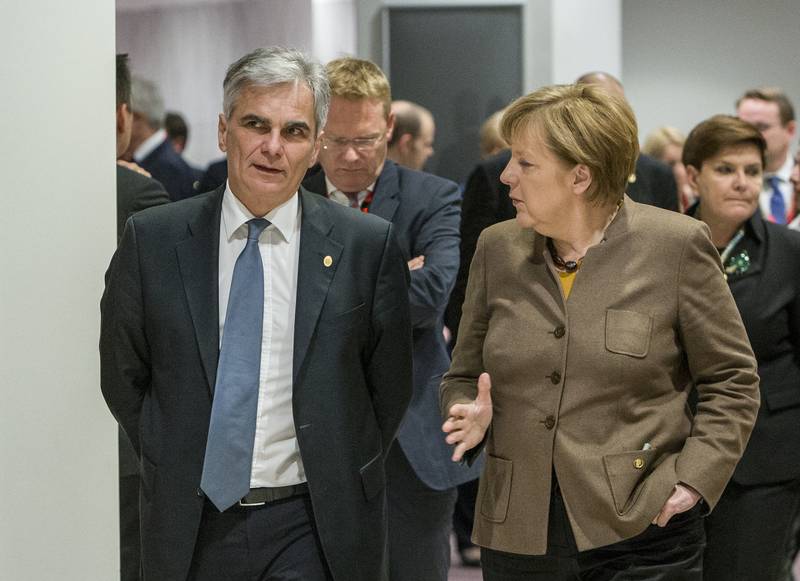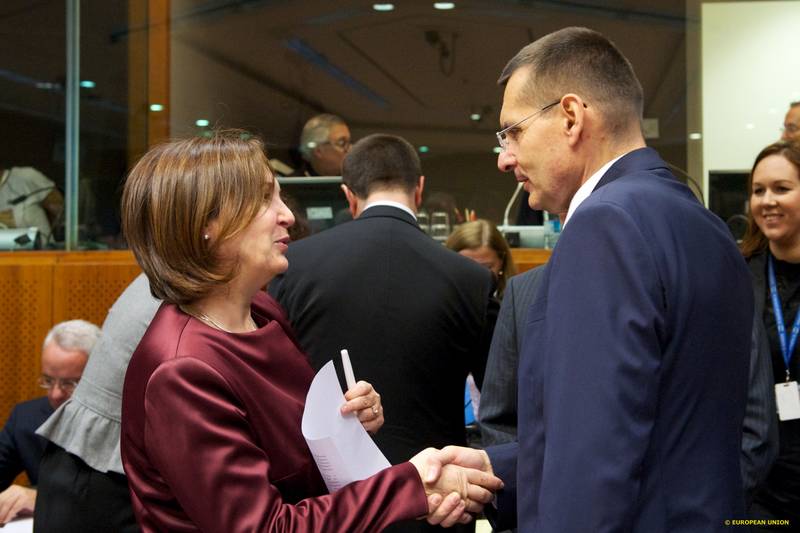European Commission Wants to Take Control over Schengen
Adelina Marini, September 21, 2011
 Whatever decision, related to the reintroduction of internal border controls in the European Union, will be taken by the European Commission and will be implemented together with the member states, and the European Parliament will be duly informed about the foreseen measures. This is the essence of the proposed changes by the Commission, aimed at strengthening the Schengen visa-free area governance. The Commission's decision will define the scope and duration of the reintroduction of border control and it can be extended for a period no longer than 30 days, as the maximum is six months, it became clear from the presentation of the communication by EU Home Affairs Commissioner Cecelia Malmstrom.
Whatever decision, related to the reintroduction of internal border controls in the European Union, will be taken by the European Commission and will be implemented together with the member states, and the European Parliament will be duly informed about the foreseen measures. This is the essence of the proposed changes by the Commission, aimed at strengthening the Schengen visa-free area governance. The Commission's decision will define the scope and duration of the reintroduction of border control and it can be extended for a period no longer than 30 days, as the maximum is six months, it became clear from the presentation of the communication by EU Home Affairs Commissioner Cecelia Malmstrom.
Currently the Schengen security area has 25 member states but not all of them are members of the European Union (Norway, Iceland and Switzerland). From the EU member states only three are not part of the Schengen zone - Bulgaria, Romania and Cyprus. 43 thousand kilometres of sea borders, 80 thousand kilometres of land borders and each year tourists make 1.25bn travels with no obstacles at all. After living through the "European spring" with the reunification of the European continent after the removal of the Iron Curtain, where all romantics and idealism from the open borders and sense of freedom have faded, the problems have come, partly enhanced by the Arab Spring that is flourishing along the South-Eastern borders of the EU.
Although the Arab Spring is an essential part of the reasons for reform of Schengen, it has to be admitted that there is another reason for the failure of countries like Bulgaria and Romania, although having completed the technical criteria for membership, to accept the principles laid in the foundation of the Schengen area, the main among which is trust. "With this proposal we hope to strengthen trust in Schengen", Ms Malmstrom said when presenting the document. "There are several problems at the borders of the EU. The evaluation has been quite weak. The problem is not that there is too much Europe but too little", the EU Commissioner added responding to criticism for the constantly growing appetite of European institutions to enhance the community method.
"Schengen was created to boost mobility among our fellow citizens and  businesses. This is a joint project", Cecilia Malmstrom stressed by adding that Schengen was still functioning but there were threats and weaknesses at the external borders.
businesses. This is a joint project", Cecilia Malmstrom stressed by adding that Schengen was still functioning but there were threats and weaknesses at the external borders.
What is new in the Commission's proposal
The current mechanism relies on the intergovernmental system of peer review which has proved insufficient to eliminate effectively all the weaknesses. This is why the Commission thinks that the community method will deliver better results. Part of the foundations of the reform of the Schengen area have already been laid in the end of last and the beginning of this year when enhanced surveillance has been introduced, envisaging announced and unannounced visits in a member state by teams led by the Commission, with experts from other member states and Frontex. The aim is to verify the application of the Schengen acquis.
Beyond all other possibilities, this approach will serve as an insurance in case that opinion prevails that Bulgaria and Romania must become members, in spite of the lack of trust toward their ability to safeguard the Union's external borders, given that they show zero results in their fight with corruption and organised crime within their own borders. After each visit a report will be made in which the deficiencies will be listed with clear recommendations what has to be done with clear deadlines. The assessed member state will have to prepare an action plan in which it has to state what it intends to do in order to implement the recommendations. With additional visits the implementation of the action plan will be observed.
If the assessed country proves to be stubborn and does not tackle the recommendations, it might be necessary to reintroduce border control at internal borders with the failing member state, where the situation is such as to constitute a serious threat to public policy or to internal security at the Union or national level. It is, of course, underlined that this is a measure of last resort but is pointed out that it will be enacted until the circumstances are mitigated. Although the word 'insurance' is not used, it is written in the document that the inclusion of such a possibility in the Schengen governance will serve as a preventive measure, with deterring effect.
A serious threat for the public policy or for the internal security will remain the main grounds for reintroduction of internal border controls, is explicitly underlined in the communication, as the strict criteria for the exceptional derogation from the area without internal borders are not being loosened. Border control can be reinstated when there are persistent deficiencies to manage a sector of the external border of the Union. This is related to situations where a large number of third country nationals cross the external border of one or more member states, which on its part might result in unexpected and significant secondary movements of third country nationals found to be staying irregularly in the territory of other member states.
It was because of such a case that Italy and France got involved in a conflict this spring when France decided to temporary close its border with Italy because of Rome's decision to let refugees from North Africa move freely on its territory.
The member states can reinstate borders in urgent situations unilaterally but only for a limited period of time - of five days. A possible extension of this term can be decided on a European level. Borders can be reinstated also with foreseeable events with mainly local and short-term impact. Experience shows that this is being done most often with big sports events, political demonstrations, big political summits, etc. Since the entry into force of the Schengen Code in October 2006 internal border controls have been reinstated 22 times. For the past year this was done four times, as the latest of them were in Norway and Sweden because of the terrorist attack in Norway. In most cases it is about sports events, protests and big summits.
 Border control can be reinstated when there are urgent and unforeseen short-term events like terrorist attacks or serious crimes, when it is necessary to limit the chances of escape of perpetrators.
Border control can be reinstated when there are urgent and unforeseen short-term events like terrorist attacks or serious crimes, when it is necessary to limit the chances of escape of perpetrators.
In general the Commission's communication can be defined as not that much a proposal with some serious new ideas but more like an analysis of the current situation and the possible ways for it to be solved. However, the document is obviously open and for sure will be expanded, moreover since there are no specific conditions that can help avoid a free interpretation of the envisaged cases.
A Schengen Cop is needed
As could have been expected, the liberals in the European Parliament welcomed precisely the community approach in the document - something they support in every regard possible, including the economic governance. ALDE's leader Guy Verhofstadt, a former prime minister of Belgium, said that the recent events in France and Italy showed that the current intergovernmental control did not work. "What we miss is a proper evaluation mechanism and some sort of 'Schengen policeman' who can intervene in case a Member State does not live up to its obligations".
precisely the community approach in the document - something they support in every regard possible, including the economic governance. ALDE's leader Guy Verhofstadt, a former prime minister of Belgium, said that the recent events in France and Italy showed that the current intergovernmental control did not work. "What we miss is a proper evaluation mechanism and some sort of 'Schengen policeman' who can intervene in case a Member State does not live up to its obligations".
Green MEP Judith Sargentini commented that the Greens welcomed the proposal. "Today’s proposals go some way towards preserving the integrity of the Schengen system, which is one of the EU’s major and tangible success stories. The Schengen border-free system is trans-national in its conception and purpose; it is therefore common-sense that any decision to temporarily reintroduce border controls be subject to EU-level approval and not left up to the narrow-minded, national whims of individual member states".
The same day when Commissioner Cecilia Malmstrom announced with her inherent charm the Commission's ideas, it became clear that the government of the Netherlands would do its utmost to prevent Bulgaria and Romania from joining Schengen unprepared. The Netherlands was the first member state who had officially requested binding the Schengen membership of both countries with their achievements on the Control and Verification Mechanism in the area of justice and home affairs, imposed on the two countries with their accession to the EU in 2007 because of insufficient preparedness to implement the criteria in justice and home affairs.
For five years after Sofia's and Bucharest's accession, not just that there are no results in the fight against corruption and organised crime, but consequent governments, and even the opposition in Bulgaria, consider the issue insulting and incorrectly put. The country's diplomacy, however, is weak not for the lack of principle rightness, but for the lack of argumentation with real achievements. And this year's report of the European Commission on the mechanism unveiled that same inertness and tangible reluctance of the Bulgarian authorities to change anything in the status quo. The judiciary is still unreformed, corruption is an ubiquitous, given that affects most of all the EU funds absorption.
Bulgaria has threatened that it will not support the Commission's proposal
 "Of course, if on September 22 a reasonable solution is achieved, that meets the interests of all of Europe and especially the best interests of Bulgarian citizens, we will support the reform of the Schengen acquis in the EU. If, however, no such decision is taken, we shall need to carefully consider our entire policy from now on regarding the support we give to the reform of the European legislation on Schengen. Because ultimately the rules are written to be complied with", said Minister of Foreign Affairs of Bulgaria Nickolay Mladenov at an urgently convened news conference on Saturday morning in response to the Dutch decision.
"Of course, if on September 22 a reasonable solution is achieved, that meets the interests of all of Europe and especially the best interests of Bulgarian citizens, we will support the reform of the Schengen acquis in the EU. If, however, no such decision is taken, we shall need to carefully consider our entire policy from now on regarding the support we give to the reform of the European legislation on Schengen. Because ultimately the rules are written to be complied with", said Minister of Foreign Affairs of Bulgaria Nickolay Mladenov at an urgently convened news conference on Saturday morning in response to the Dutch decision.
The Netherlands is stating its resistance against further compromises for Bulgaria and Romania not since recently. Furthermore, this is enshrined in the coalition agreement of the country from 2010. On September 22 the Ministers of Justice and Home Affairs of the EU will take a final decision on whether Sofia and Bucharest deserve the trust to safeguard not a small part of EU's external borders, like for example the border with the Caucus countries and Turkey, which on its part is in a visa-free regime with Iran. In order to get approval, it is necessary all member states to say "yes".
It is very unlikely that Mr Mladenov's threat will have an impact on the voting because because protection of external borders is concerned and national interests. And words like "rules are written to be complied with", uttered by a country that for five years now is incapable to tackle organised crime and corruption, would rather provoke ironic smiles among the countries with deeply rooted democracy and rule of law. Something, which looks even more unachievable and obviously unwanted by Bulgaria, whose citizens take it emotionally for a national pride insult instead of thinking what is wrong. And what is wrong is definitely not caused outside but inside. And it is high time that we understand this, comprehend it and realise it.
 Federica Mogherini | © Council of the EU
Federica Mogherini | © Council of the EU | © Council of the EU
| © Council of the EU Luis De Guindos | © Council of the EU
Luis De Guindos | © Council of the EU Werner Faymann, Angela Merkel | © Council of the EU
Werner Faymann, Angela Merkel | © Council of the EU Rumyana Bachvarova, Petre Toba | © Council of the EU
Rumyana Bachvarova, Petre Toba | © Council of the EU Meglena Kuneva | © Council of the EU
Meglena Kuneva | © Council of the EU